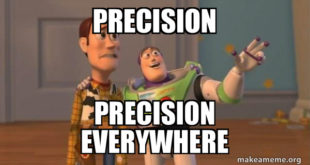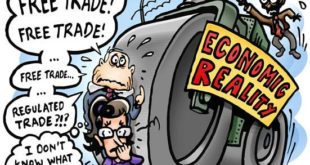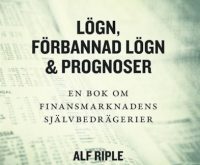Evidence-based policy — a façade of precision The façade of precision … is perhaps the most important in debunking SABER (the World Bank’s Systems Approach for Better Education Results initiative), GEEAP (the World Bank’s and UK Aid’s new Global Education Evidence Advisory Panel), and other attempts to make evidence-based policy. To assess quantitatively the impact of an intervention, there are two ways to rule out confounding variables – statistical...
Read More »‘Nobelpriset’ i ekonomi haltar betänkligt
‘Nobelpriset’ i ekonomi haltar betänkligt Sveriges Riksbanks pris till Alfred Nobels minne delas i år av tre framstående amerikanska ekonomer. Pristagarna Ben Bernanke, Douglas Diamond och Philip Dybvig, får priset för sina studier som belyser bankernas och banksystemets roll … Trions forskningsresultat och prestationer är världsberömda … och i denna kommentar finns det inte något behov eller avsikt att förringa de prisbelönta forskarna eller deras...
Read More »The false promise and bitter fruit of Neoliberalism: political economic disembedding, cultural transformation, and the rise of proto-fascist politics
Neoliberalism is a political economic philosophy that consists of two claims, one economic and the other political. The economic claim is free market laissez-faire economies are the best way to organize economic activity as they generate efficient outcomes that maximize well-being. The political claim is free market economic arrangements promote individual liberty. This paper argues […]
Read More »Methodological overconfidence
Worst of all, when we feel pumped up with our progress, a tectonic shift can occur, like the Panic of 2008, making it seem as though our long journey has left us disappointingly close to the State of Complete Ignorance whence we began … It often takes years down the Path, but sooner or later, someone articulates the concerns that gnaw away in each of us and asks if the Assumptions are valid … It would be much healthier for all of us if we could accept our fate, recognize...
Read More »Who to blame for the inflation
Who to blame for the inflation .[embedded content]
Read More »The economist’s oath
. — I will remember that I didn’t make the world, and it doesn’t satisfy my equations. — Though I will use models boldly to estimate value, I will not be overly impressed by mathematics. — I will never sacrifice reality for elegance without explaining why I have done so. — Nor will I give the people who use my model false comfort about its accuracy. Instead, I will make explicit its assumptions and oversights. — I understand that my work may have enormous effects on society...
Read More »Mainstream economics — a form of brain damage
Mainstream economics — a form of brain damage .[embedded content]It is difficult to understand why mainstream economists keep on using their unreal and irrelevant models! Sure, you get academic accolades and give the impression of having something deep and ‘scientific’ to say, but that should count for nothing if you’re in the truth business. As long as that kind of modelling output doesn’t come with the accompanying warning text “NB! This is model-based...
Read More »Sabotaging Germany, blaming Russia: another view of the Nord Stream pipeline attack
Imagine Moscow was nuked yesterday, and this morning The New York Times ran a frontpage headline “Moscow nuked: Russia proves its hostility to Europe again”. Sounds pretty crazy? Yet, in a manner of speaking, that is what happened last week. On Tuesday September 27th three major leaks caused by undersea explosions were discovered in the […]
Read More »Free trade delusions
We must ask why economists still ignore the obvious reality that application of their standard free trade model failed to generate broad-based income gains. Why do many still turn a blind eye to the mounting evidence of the social, economic, and human costs of the globalization experiment? Some were genuinely misled by the fancy algebra. But many know their models are irrelevant. They were seduced by the surprising willingness of political leaders to believe their sophistries...
Read More »Riksbankens usla prognoser
Nationalekonomer hävdar ofta — vanligtvis med hänvisning till Milton Friedman och hans metodologiska individualism — att det inte gör så mycket om de antaganden som deras modeller bygger på är realistiska eller ej. Vad som betyder något är om de prognoser som modellerna resulterar i visar sig vara riktiga eller ej. Om det verkligen är så, är den enda slutsats vi kan dra att dessa modeller och prognoser hör hemma i papperskorgen. För oj vad fel de har haft! Riksbanken har sedan...
Read More » Heterodox
Heterodox






